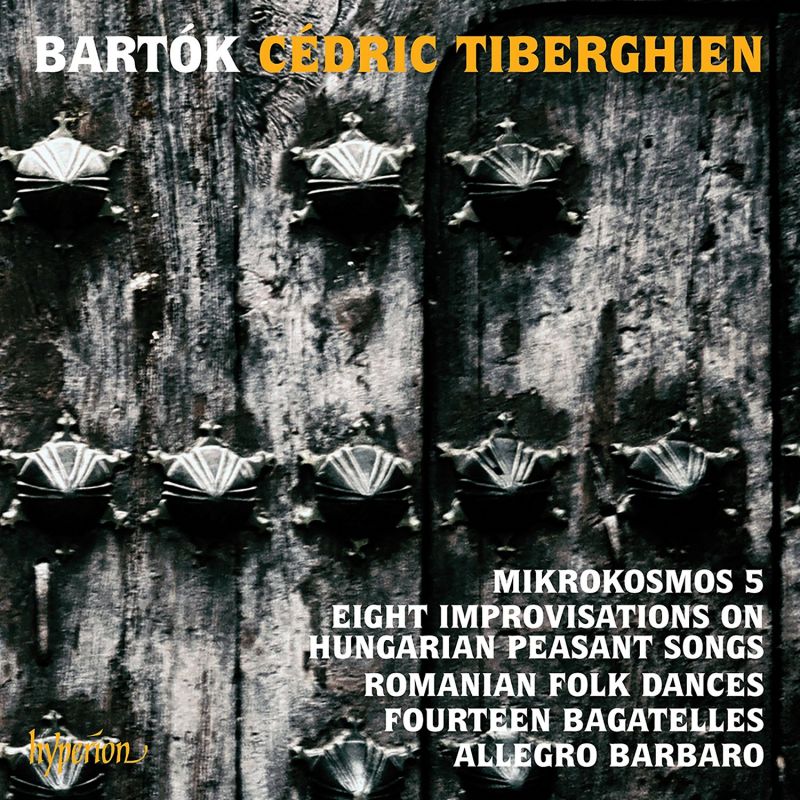BARTÓK Mikrokosmos Book 5
View record and artist detailsRecord and Artist Details
Composer or Director: Béla Bartók
Genre:
Instrumental
Label: Hyperion
Magazine Review Date: 11/2016
Media Format: CD or Download
Media Runtime: 73
Mastering:
DDD
Catalogue Number: CDA68133

Tracks:
| Composition | Artist Credit |
|---|---|
| (6) Romanian Folkdances |
Béla Bartók, Composer
Béla Bartók, Composer Cédric Tiberghien, Piano |
| (14) Bagatelles |
Béla Bartók, Composer
Béla Bartók, Composer Cédric Tiberghien, Piano |
| Allegro barbaro |
Béla Bartók, Composer
Béla Bartók, Composer Cédric Tiberghien, Piano |
| (8) Improvisations on Hungarian Peasant Songs |
Béla Bartók, Composer
Béla Bartók, Composer Cédric Tiberghien, Piano |
| Mikrokosmos, Book 5 |
Béla Bartók, Composer
Béla Bartók, Composer Cédric Tiberghien, Piano |
Author: Rob Cowan
Right from the first track of the CD under review, the first of the Six Romanian Folk Dances, you encounter a very original approach, with marked appoggiaturas and a clipped staccato, quite unlike, say, the classic readings by György Sándor (Sony Classical and Vox) or Zoltán Kocsis (Decca). The 14 Bagatelles, Op 6 (1908) – miniature masterpieces all of them, comparable with Prokofiev’s Visions fugitives – are played with a sensitive touch and much tonal imagination, a high point being the 12th of them, with its slowly accelerating repeated notes and melancholy, cimbalom-style runs towards either the treble or the bass. Bach, who takes a half a minute longer than Tiberghien to cover the same musical territory (5'32" as opposed to Tiberghien’s 5'00"), also achieves a sense of profoundly elegiac musing. The relentlessly driving Allegro barbaro of 1911 is performed by Tiberghien with considerable freedom and flexibility – not at all the sort of merciless onslaught we so often hear – and the fifth book of Mikrokosmos is characterful enough to counter the music’s didactic ground springs. A good sequence to sample would be tracks 32 34.
But for me the disc’s highlight is also one of Bartók’s greatest works, the Eight Improvisations on Hungarian Peasant Songs, music contemporary with The Miraculous Mandarin that shares with its orchestral sibling not only an audacious sense of experimentation but a feel for exotic tone colours and tart, folk-like rhythms. Tiberghien homes in on the ‘improvisational’ element, much as Bach does (and Sándor did before him).
A fine programme overall, then, much to be recommended; but, in addition to Tiberghien and such ‘staples’ as Kocsis and Sándor (the latter especially on Vox), do keep an ear out for Andreas Bach, a more wilful player, it’s true, but someone whose maverick spirit has something unique to teach about this endlessly fascinating music.
Discover the world's largest classical music catalogue with Presto Music.

Gramophone Digital Club
- Digital Edition
- Digital Archive
- Reviews Database
- Full website access
From £8.75 / month
Subscribe
Gramophone Full Club
- Print Edition
- Digital Edition
- Digital Archive
- Reviews Database
- Full website access
From £11.00 / month
Subscribe
If you are a library, university or other organisation that would be interested in an institutional subscription to Gramophone please click here for further information.




